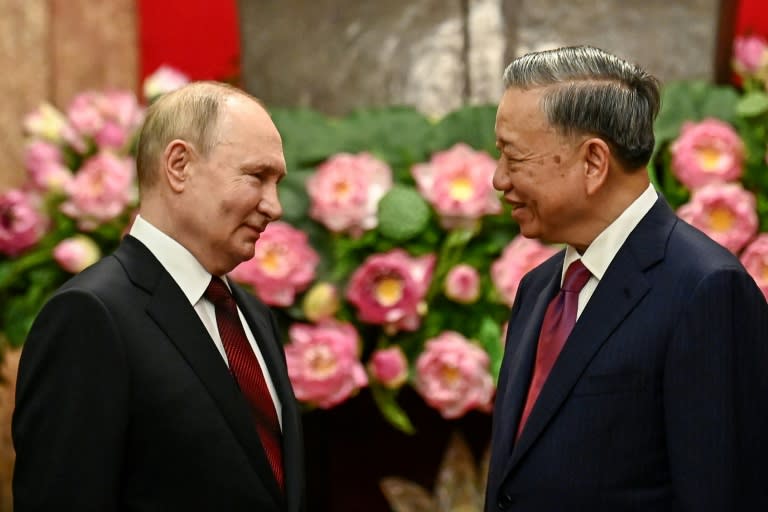Putin does not rule out sending arms to N.Korea, US 'incredibly' concerned

Vladimir Putin said Thursday he does not rule out Russia sending arms to isolated North Korea in what Washington called an "incredibly concerning" statement that threatens instability on the divided Korean peninsula.
On a trip to Vietnam following a state visit to Pyongyang where Russia and North Korea signed a mutual defence pact, Putin also warned South Korea not to arm Ukraine.
The Russian president said prospects of Moscow providing weapons to North Korea are repercussions for the West arming Kyiv, which is battling against a Russian invasion now in its third year.
"Those who send these (missiles to Ukraine), think that they are not fighting us, but I said, including in Pyongyang, that we then reserve the right to supply weapons to other regions of the world, with regard to our agreements with the DPRK," Putin said, using the acronym of North Korea's official name.
"I do not rule this one out."
South Korea on Thursday called Russia's treaty with the North a "grave concern", with a senior official saying Seoul would "reconsider" its policy of not sending arms directly to Ukraine.
Putin brushed off the response, saying "South Korea has nothing to worry about."
But he warned Seoul not to supply weapons to Kyiv, saying: "This would be a very big mistake."
The United States expressed deep unease over Putin's threat to send weapons to Pyongyang, warning such action could destabilize the Korean peninsula.
"It is incredibly concerning," State Department spokesman Matthew Miller told reporters.
"It would destabilize the Korean peninsula, potentially, depending on the type of weapons, and might violate UN Security Council resolutions that Russia itself has supported."
- Pact with Vietnam -
Russia and Vietnam, a close Moscow ally since the Cold War, pledged to deepen ties during Putin's state visit aimed at bolstering alliances.
The Russian leader did not receive as clear a declaration of support in Hanoi as he did in Pyongyang, where he got a rapturous reception. But Vietnamese President To Lam indicated a desire to boost defence cooperation.
Russia has been Vietnam's main arms supplier for decades, but orders have dropped off in recent years as international sanctions related to the Ukraine conflict have intensified.
The two sides said in a joint statement that their defence and security cooperation was "not directed against any third country" and contributed to "peace, stability and sustainable development" in the region.
Putin told reporters the talks were constructive and that both sides had "identical or very close" positions on key international issues.
Putin later held talks with Nguyen Phu Trong, the powerful general secretary of the ruling Communist Party, and laid a wreath at the memorial to independence leader Ho Chi Minh.
- Drumming up support -
Putin's Asia tour came as the United States, Britain and the European Union all announced new sanctions aimed at constraining Russia's war in Ukraine.
The G7 meanwhile agreed to use profits from frozen Russian assets to provide a new $50 billion loan to Kyiv.
Making his first visit to isolated North Korea in 24 years on Wednesday, Putin signed a strategic treaty with leader Kim Jong Un that included a commitment to come to each other's aid if attacked.
Washington and its allies accuse North Korea of supplying ammunition and missiles to Russia for its war, and the new treaty has fuelled fears of more deliveries.
The two countries have been allies since North Korea's founding after World War II and have drawn even closer since Russia's invasion of Ukraine in 2022 isolated Putin on the global stage.
Kim vowed his "full support and solidarity" over the Ukraine war, which has also triggered rafts of United Nations sanctions on Moscow.
Mykhailo Podolyak, a senior aide to Ukraine's President Volodymyr Zelensky, said Putin's trip was a tour of "yesterday's satellites of the USSR" in search of "military and technical aid and cannon fodder".
His reception was reserved in Vietnam, a major global manufacturing hub that has carefully hedged its foreign policy position for years, seeking to be friends with all but beholden to none.
It has particularly sought to avoid picking sides in the growing US-China rivalry as both superpowers look to boost their influence in Southeast Asia.
US President Joe Biden visited Hanoi in September to promote ties as his administration seeks to build up Vietnam as an alternative supplier of key high-tech components to reduce American dependence on China.
Chinese President Xi Jinping followed suit, making his own state visit barely three months later.
burs-pdw/mlm/sst

 Yahoo News
Yahoo News 
